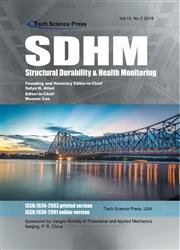Experimental Study on Compressive Strength of Recycled Aggregate Concrete under High Temperature
Q2 Engineering
SDHM Structural Durability and Health Monitoring
Pub Date : 2021-01-01
DOI:10.32604/sdhm.2021.015988
引用次数: 7
Abstract
This research aims to study the effect of elevated temperature on the compressive strength evolution of concrete made with recycled aggregate. Demolished building concrete samples were collected from four different sites in Saudi Arabia, namely from Tabuk, Madina, Yanbu, and Riyadh. These concretes were crushed and recycled into aggregates to be used to make new concrete samples. These samples were tested for axial compressive strength at ages 3, 7, 14, and 28 days at ambient temperature. Samples of the same concrete mixes were subjected to the elevated temperature of 300°C and tested for compressive strength again. The experimental result reveals that the recycled aggregate concrete samples have good quality at ambient and elevated temperatures and are considered fairly close to the concrete made with natural aggregate. However, recycled aggregate concrete at high temperatures showed higher strength degradation than natural aggregate concrete, but with differences that do not exceed 5% to 10%. The concrete samples made from recycled coarse aggregates also reached the design strength. It can be considered acceptable, considering the high variation in the concrete’s thermal response found in the literature.再生骨料混凝土高温抗压强度试验研究
本研究旨在研究高温对再生骨料混凝土抗压强度演变的影响。拆除的建筑混凝土样本从沙特阿拉伯的四个不同地点收集,即塔布克、麦地那、延布和利雅得。这些混凝土被碾碎并回收成集料,用于制作新的混凝土样品。这些样品在3、7、14和28天的环境温度下进行了轴向抗压强度测试。将相同的混凝土混合料试样进行300℃的高温试验,并再次进行抗压强度测试。试验结果表明,再生骨料混凝土试样在常温和高温条件下均具有良好的性能,与天然骨料混凝土性能相当接近。然而,高温下再生骨料混凝土的强度退化高于天然骨料混凝土,但差异不超过5% ~ 10%。回收粗骨料制成的混凝土样品也达到了设计强度。考虑到在文献中发现的混凝土热响应的高变化,它可以被认为是可以接受的。
本文章由计算机程序翻译,如有差异,请以英文原文为准。
求助全文
约1分钟内获得全文
求助全文
来源期刊

SDHM Structural Durability and Health Monitoring
Engineering-Building and Construction
CiteScore
2.40
自引率
0.00%
发文量
29
期刊介绍:
In order to maintain a reasonable cost for large scale structures such as airframes, offshore structures, nuclear plants etc., it is generally accepted that improved methods for structural integrity and durability assessment are required. Structural Health Monitoring (SHM) had emerged as an active area of research for fatigue life and damage accumulation prognostics. This is important for design and maintains of new and ageing structures.
 求助内容:
求助内容: 应助结果提醒方式:
应助结果提醒方式:


